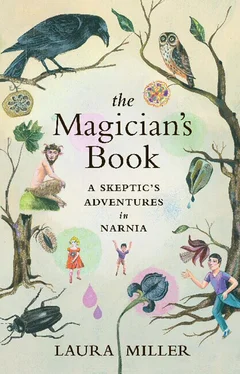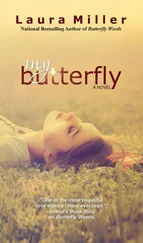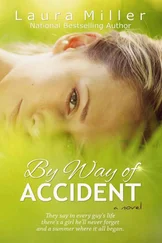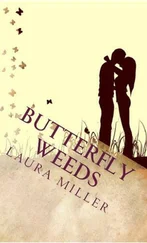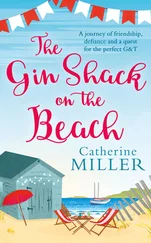Chapter Four
Boxcar Children
It wouldn’t be truthful to say that the only books I liked as a child were fantasy stories, although those were my favorites, and I became adept at sniffing them out, often with as little as a title and cover art to go by. I did read books like Laura Ingalls Wilder’s Little House on the Prairie and a Newbury Medal winner by Scott O’Dell called Island of the Blue Dolphins, about a Native American girl who is left behind on an island when her tribe is evacuated. The Wilder books were enjoyable if not riveting, but Island of the Blue Dolphins had real power. With its detailed descriptions of the girl learning how to make weapons to hunt with, to find fresh water, to dry meat, and to fend off the island’s wild dogs, it fascinated me. I persuaded a neighborhood friend to set up a “camp” in a corner of her backyard, where we crouched, pretending to be Indian hunters, draping slices of raw bacon over strings suspended between a couple of shrubs and calculating how much trouble we were likely to get into if we lit a fire to cook them over.
Both Little House on the Prairie and Island of the Blue Dolphins took what I considered to be a laudable interest in the nuts and bolts of survival in other times and places; I remember the maple-syrup-making scenes from the Wilder books more vividly than anything else. However, Island of the Blue Dolphins had one great advantage over Little House on the Prairie: no parents. A few years ago, while I was working on an essay about the boom in “problem novels” — fiction for young people centering on a trauma or an issue like drug addiction or rape — my editor reminisced about reading Island of the Blue Dolphins as a girl, too. “I can’t believe they give a book like that to children,” she remarked. “It’s about being abandoned by your family! What could be more disturbing?” I was startled; it had never occurred to me before that the novel described a terrifying scenario, although the girl’s situation was occasionally desperate. I didn’t see her as abandoned. To my child’s mind, she was liberated.
If you had asked me then what I liked so much about the Narnia books — or E. Nesbit’s Five Children and It or Edward Eager’s Half Magic series, among other favorites — I would eventually discover, I probably would have told you it was the magic. Reading them now, what I notice is the absence or irrelevance of parents. Mothers and fathers play, at best, a very minor supporting role in the Nesbit and Eager books. Sometimes beloved adults are sick or otherwise troubled and need to be rescued. Otherwise, if they’re around at all, they just get in the way.
The parents of the four Pevensie children, who have sent them off to stay in an old house in the country “because of the air-raids,” go nearly unmentioned in The Lion, the Witch and the Wardrobe. (Early in the story, Edmund accuses Susan of “trying to talk like Mother,” and he does not mean it appreciatively.) When the children arrive at Professor Kirk’s house, they never speak of the war that brought them there or of missing their parents; instead they go on excitedly about all the animals they hope to find in the countryside (“Badgers!” “Foxes!” “Rabbits!”). “This is going to be perfectly splendid,” Peter announces, without a hint of ambivalence. People who see the novel’s story as precipitated by trauma (the bombings, separation) are misreading it, as adults are prone to do.
It’s often been said of a certain kind of children’s book that the author has to get rid of one or both parents before anything interesting can happen. Nancy Drew has a father but no mother because no self-respecting mother would allow her teenage daughter to gallivant around in a blue roadster, chasing criminals. (A fond father can be gotten around, and apparently even coaxed into springing for the roadster.) Nancy’s mother is simply gone, and apparently unmourned, because Nancy exists in a fictional fantasy world where a missing mother is not missed.
While this isn’t very plausible, it is understandable. In the great enterprise of growing up, a child’s imagination practices the painless, surgical removal of an attachment that, however essential it may be at the moment, will sooner or later have to be left behind. The same child (myself, for example) who finds imagining her parents’ deaths heart-freezingly scary will also fantasize about the exciting escapade of being left entirely to her own devices. In her memoir, Welcome to Lizard Motel, the educator Barbara Feinberg describes leading a children’s creativity workshop whose participants liked pretending they were orphans, though not, one little girl clarified, “the sad part of orphans.”
Had anyone quizzed me further about the kinds of books I liked, I would have said that I wanted to read about adventures, and those didn’t happen when parents were around. The presence of Mother and Father guaranteed that children were stuck being children. Without their parents, Narnia’s young visitors finally get the chance to try out all the practical knowledge they’ve acquired over their years of reading what Lewis, in The Voyage of the Dawn Treader, refers to as “the right books.”
The Pevensies know all about jungle explorers and buccaneers and questing knights, and they can keep their heads in a crisis; they belong to a long tradition in British fiction of what the novelist and critic Colin Greenland calls “competent children.” I admired both their wherewithal and the delicacy of their scruples in a scene from The Lion, the Witch and the Wardrobe in which all four of the siblings have finally made it through the wardrobe and debate what to do next. They decide to put on the fur coats from the wardrobe before venturing on into the snowy woods, reasoning that because they’re not actually taking the coats out of the wardrobe, they won’t be stealing them.
The second Chronicle, Prince Caspian, of which a goodly portion is a wilderness adventure yarn, begins with the Pevensies magically yanked back into Narnia and stranded on a desert island. They are made castaways without the preliminary grief of a shipwreck, but as usual they’re not at a loss. I was especially impressed when Peter announced to his thirsty siblings, “If there are streams they’re bound to come down to the sea, and if we walk along the beach we’re bound to come to them.” I stowed that tip away for the future. As the oldest child in my own tribe of brothers and sisters, I thought this was exactly the sort of thing I ought to know in the event of an emergency — though how, exactly, we might be lucky enough to get shipwrecked together I didn’t consider. Likewise, Susan keeps the two younger children from abandoning their hot, heavy shoes after a wade in the surf because “we shall want them if we’re still here when night comes and it gets cold,” and Edmund suggests exploring the woods: “Hermits and Knights Errant and people like that always manage to live somehow if they’re in a forest. They find roots and berries and things.”
Later in Prince Caspian, under the influence of the Narnian air, the Pevensies will begin to recall all of the skills — archery, sword fighting, the composition of a formal challenge to single combat — they acquired in The Lion, the Witch and the Wardrobe, during their time as kings and queens. At first, however, their points of reference are strictly literary. From Defoe and Stevenson, possibly Walter Scott, and any number of less exalted authors, they have acquired this idea of adventure, and they don’t consider themselves to be excluded from it simply because they’re children. Play has girded them for action, and initially Narnia itself has to be distinguished from a game of make-believe. “We can pretend we are Arctic explorers,” suggests Lucy in The Lion, the Witch and the Wardrobe, as the siblings set off through the woods. “This is going to be exciting enough without pretending,” Peter points out. Narnia is a place so thrilling that you can finally stop imagining you’re somewhere better. It is the place where adventures are transformed from something you read about in books to something you actually get to do.
Читать дальше
